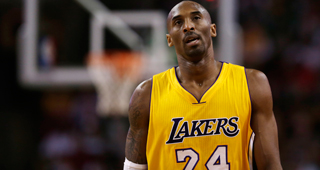Fame is a kind of double existence. You’re you, of course, and you’re also this grand myth. The first thing is hard to control and the second thing hardly has anything to do with you. It’s a madman running naked down the street wearing your face as a mask. You might have a few theories about the madman’s motivations, or argue in interviews that he’s not as mad as he seems, but it’s mostly out of your hands. You become, at best, an influential reader of your own text.
It must seem sometimes, that you are more the second thing than the first. Because the second thing transcends. It is—you are—a pure object of discussion, and it dies when people stop talking about it. Not, crucially, when you die, because even more people than usual are going to talk about that. When Michael Jackson’s doctor got the dosage wrong, M.J. achieved levels of cultural relevance he hadn’t accessed since Thriller, a public fervor the man himself wasn’t around to experience it, because the phenomenon was set into motion by the cessation of his heartbeat. He died in a room and sprung suddenly to life everywhere else. Sometimes facts themselves contain a certain ghoulishness.
We’re getting better at obituaries, in some respects. There’s no holding the dead accountable, but when we grapple with, say, David Bowie’s sexual encounters with underage girls, we’re trying to create the world we’d like to see, where great figures are also exceedingly kind and conscientious people—or failing that, less than egregiously cruel. This is noble enough. If we’re all going to talk at once, some of us might as well undercut the inevitable hagiographies, which are both boring and counterproductive. When Joe Paterno died, a fair number of obits struck an angry and remorseful tone, mea culpas too late to save Jerry Sandusky’s victims but finally faintly hopeful that maybe, with renewed vigilance, we’d catch this sort of villainy sooner next time. Who knows how much good this stuff does—how many wretched men are right this moment skating by on status and public piety—but it is at least a modest act of responsibility.
Kobe Bryant died at 41 on Sunday. I don’t think I’m educating you here, but failing to include this would be reckless: in July of 2003, Kobe was accused of sexually assaulting a hotel staffer in Eagle, Colorado. He bent her over a chair, choked her, and drew blood while penetrating her. He admitted to doing all three of those things, but his gloss on the event was different from hers. He thought it was consensual. She didn’t, and though her official position shifted when she refused to testify in criminal court, it did so only after months of harassment, shaming, and character defamation from Kobe’s legal team and an out-of-court civil settlement, the details of which are opaque by design. Read into the whole hideous process what you will. I know what I see.
The shadow this casts over every other aspect of Kobe’s life is as long as you want it to be. I was scrolling through Twitter a couple hours after his death was reported and the most striking thing I found was a video of a dad and his young daughter outside Staples Center, the man visibly hollowed out by grief. He was driving her to Disneyland when he got the news and had to pull over into a parking lot to sift through the mysterious deluge of texts and voicemails he’d received. “My dad—like, people don’t get it,” he says, trying not to cry, “I had Kobe. There wasn’t a lot of people for me to look up to… There wasn’t a ton of strong black men that I was able to look up to, that could be an example for me.” While he speaks, his daughter is in his arms, sucking on a pacifier and playing with the drawstrings on his hoodie. The guy is crushed flat. His hero is gone.
There’s no part of writing this that doesn’t feel exploitative. The bong rip philosophizing, the hand-wringing and dutiful disclosures, the Regular Person reax-gawking. It’s all shot through with cynicism, larded with faux weightiness that death invites, like a friend of a friend you don’t like, standing in your doorway with a Marlboro hanging off his lip. You do what you feel like you are supposed to do, and resolve to feel bad about it afterwards. Come on in, I guess.
I will offer, totally uselessly, that I really liked Kobe Bryant. He tried too hard to be interesting but was also genuinely interesting. The impeccability of his craft was staggering, and he was good at talking—sometimes quite obviously, hilariously lying—about why he did the things he did on the court. He conceived of himself as an artist, with all the pretension and vanity that suggests. He appreciated the mythic dimension of his life and, much like LeBron but way more strangely and specifically, sought to control the shape of it. You could call this self-delusion and you’d be right. I was usually pleased that he made the effort.
Of course all efforts are pitiful in the face of matter-of-fact oblivion, senseless death. A man who was walking around on Sunday morning, who meant so much in so many directions to people the world over, and with a special intensity in Los Angeles, has died alongside a daughter he loved, and seven other people whom the world doesn’t know nearly as well, but who loved and were loved too.
At the very end we belong to ourselves, and then, forever after, those we leave behind, who remember us. Kobe left pretty much everybody behind. We’ll measure the implications of that in time. For now, sadness, sympathy, and horror prevail.



